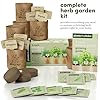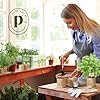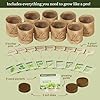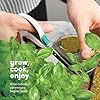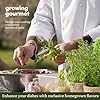IDEA FAMILY 6x2x1ft Oval Galvanized Raised Garden Bed Outdoor 9-in-1 Large Metal Modular Planter Box Raised Beds for Gardening,Vegetables,Fruits,Flowers & Herbs (White)
33% Offzizin 2 Pack Galvanized Raised Garden Bed Metal Oval Raised Garden Beds Outdoor Planter Box for Vegetables (6x3x1FT, Silver)
$54.99 (as of 14:25 GMT -05:00 - More infoProduct prices and availability are accurate as of the date/time indicated and are subject to change. Any price and availability information displayed on [relevant Amazon Site(s), as applicable] at the time of purchase will apply to the purchase of this product.)Are you ready to start composting at home? Composting is a great way to reduce waste and create nutrient-rich soil for your garden. In this beginner’s guide, we will cover everything you need to know to get started with composting.
What Is Composting and Why Should You Start?
Composting is the process of breaking down organic matter into a rich, fertile soil that can be used in your garden. It is a natural process that has been happening since the beginning of time. By composting at home, you are reducing the amount of waste that goes into landfills and creating a valuable resource for your garden.
The Basics of Starting Your Own Compost Pile
To start composting at home, you will need three things: brown material, green material, and water. Brown materials include dried leaves, shredded paper, and twigs. Green materials include fruit and vegetable scraps, grass clippings, and coffee grounds. Water is essential for keeping the pile moist but not too wet.
To build your compost pile, start by adding a layer of browns, followed by a layer of greens, and then add some water. Repeat these layers until you have a pile about 3 feet wide and 3 feet high. Make sure to leave enough space between the pile and any structures or plants nearby, as the pile may attract pests or cause damage if it gets too big.
Tips for Maintaining a Healthy Compost Pile
Once you have built your compost pile, there are several tips you can follow to maintain a healthy pile:
1. Keep the pile moist but not too wet. If the pile feels dry to the touch, add some water.
2. Turn the pile regularly to aerate it and mix up the ingredients. This helps to speed up the decomposition process.
3. Add new materials to the pile as they become available. This keeps the pile balanced and prevents it from becoming too soggy or too dry.
4. Use a mixture of browns and greens to keep the pH balance of the pile neutral. Too much acidity or alkalinity can slow down the decomposition process.
Troubleshooting Common Composting Problems
Even with careful maintenance, you may encounter some common problems when composting. Here are some troubleshooting tips:
1. The pile is too wet: Add more browns (dry material) to the pile to absorb excess moisture.
2. The pile is too dry: Add more greens (wet material) to the pile to increase moisture levels.
3. The pile smells bad: This could indicate that the pile is too wet or has an imbalance of browns and greens. Adjust the moisture level and add more browns or greens as needed.
4. The pile is attracting pests: Cover the pile with a tarp or other barrier to prevent animals from getting inside. You can also use natural repellents like citrus peels or cayenne pepper.
In conclusion, starting your own compost pile is easy and rewarding. With these tips, you can begin composting at home today and create a sustainable source of nutrient-rich soil for your garden.















